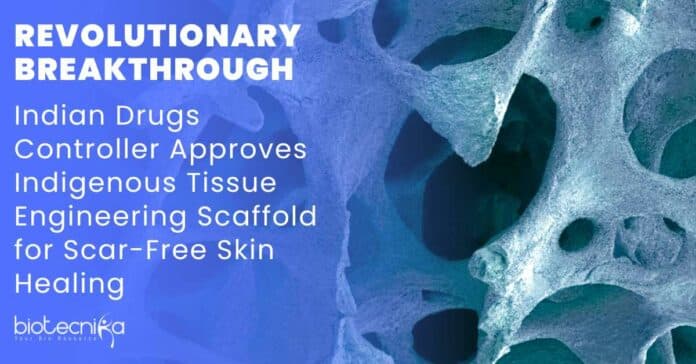Indigenous Tissue Engineering Scaffold for Scar-Free Skin Healing
The Indian Drugs Controller has given its approval for the nation’s first home-grown tissue engineering scaffold from mammalian organs, a Class D Biomedical Device derived from animals. This innovative low-cost device has demonstrated its potential to swiftly heal skin wounds while minimizing scarring.
This groundbreaking achievement is credited to the Sree Chitra Tirunal Institute for Medical Sciences and Technology (SCTIMST), an autonomous institution under the Department of Science and Technology (DST). With this breakthrough, the SCTIMST becomes the first entity within India to create Class D medical devices that adhere to all regulatory requirements laid out by the Central Drugs Standard Control Organisation, the Indian government’s drug regulatory body.
The concept of employing materials derived from animals in advanced wound care products is not novel. However, until now, no indigenous technology was available to fabricate high-quality products to meet the stringent standards of the Drugs Controller General. This gap resulted in the import of these products, leading to higher costs.
Led by Prof. T. V. Anilkumar, researchers from the Division of Experimental Pathology in the institute’s Biomedical Technology Wing formulated an innovative technology to develop tissue engineering scaffolds from mammalian organs. They
achieved this after 15 years of exhaustive research, where they successfully decellularised a pig’s gall bladder to recover the extracellular matrix. The resultant scaffold, identified as Cholederm, demonstrated an impressive ability to heal various skin wounds, including burns and diabetic wounds in rats, rabbits, and dogs, faster than similar products available in the market. The healing also resulted in minimal scarring.In 2017, Alicorn Medical, a startup biopharmaceutical firm based at the institute’s technology incubation facility, TIMed, adopted the technology.
Dr. Harikrishna Varma, the Head of Biomedical Technology Wing at the institute, pointed out the significance of this achievement, especially considering the stringent compliance requirements for Class D Medical Devices under the 2017-Medical Device Rules of India and the general perception that such devices could not be practically developed in the country.
Published research by the team in Comparative Medicine showed that the scaffold has the potential to mitigate fibrotic scarring in rats experiencing experimental myocardial infarction.
The introduction of Cholederm to the Indian market is expected to significantly reduce treatment costs, making it more affordable for the common man. Additionally, the technology used to recover the extracellular matrix from the gall bladder positions the device for potential success in the global market. It also opens up additional income opportunities for pig farmers, as the pigs’ gall bladder, typically considered a waste product, can now be used as a raw material in the biopharmaceutical industry.
However, using the membrane forms of the scaffold to treat cardiac injuries presents some challenges. The team is currently developing injectable gel formulations that allow for transvenous on-site delivery and surface modification of polymeric medical devices. Further investigations are ongoing to validate these findings, which could potentially revolutionize the treatment approach for patients suffering from myocardial infarction, as stated by Prof. T. V. Anilkumar.
Source – Indigenous Tissue Engineering Scaffold for Scar-Free Skin Healing



























